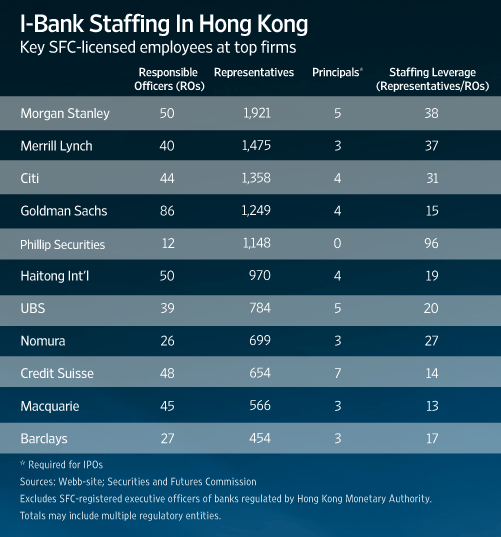HONG KONG (Dow Jones Investment Banker) – An analysis of the licenses awarded to investment banks in Hong Kong provides a good overview of the front-office resources available to each of these firms – with a few surprises. It also gives a clue as to how licensees are supervised by senior employees and shows how some firms effectively rely on scarce resources for IPO work as new issue sponsors.
As in other major markets, all front-office staff at investment banks and financial institutions in Hong Kong are required to carry one (or more) of nine license types granted by the Securities and Futures Commission (SFC). These vary from dealing in securities or advising on corporate finance to providing asset management services. Firms often use different companies for the various licenses they carry, and staff in Hong Kong can either be “Responsible Officers” (ROs) – acting in a supervisory capacity – or simply appointed as “Representatives.”
In Hong Kong, most firms are regulated by the SFC, although some houses are also banks or deposit- taking companies and therefore supervised instead by the Hong Kong Monetary Authority (HKMA).

(Except for data on sponsors, this analysis excludes the SFC-registered executive officers of HKMA-regulated banks, because of different disclosure for these positions. Figures for some banks will therefore be somewhat understated. The analysis is derived from information compiled by activist David M. Webb, a member of Hong Kong’s Takeovers and Mergers Panel and a former independent, non-executive director of HKEx).
The figures show there are currently 1,758 licensed firms in Hong Kong. On average, these have just over three ROs and about 22 Representatives each.
Across all SFC-regulated activities, and through various licensed entities, the house with the largest number of front-office staff is Morgan Stanley, with 1,921 licensees, followed by Merrill Lynch (1,475), Citi (1,358) and Goldman Sachs (1,249).
It’s more surprising, however, to find local broker Phillip Securities close behind, with 1,148 license holders, and Chinese firm Haitong International, with 970, ahead of houses with a wider international reach such as UBS (784), Nomura Holdings (699), Macquarie (566) or Barclays (454).
The ratio between Representatives and ROs also provides a clue as to how tight the management structure is at these firms. Here, the major Chinese and Japanese names often exhibit a larger number of ROs for individual entities, perhaps a reflection of a more collegial decision-making structure, as compared with the winner-takes-all form of management that prevails in firms with an Anglo-Saxon background.
Other interesting findings concern the role of IPO sponsor, which any seeker of a listing must appoint to assist it with its application. A sponsor firm must be closely involved in the preparation of the listing documents and also conduct reasonable due diligence enquiries so as to be in a position to make a number of declarations to the exchange in relation to the proposed listing. Only 78 firms are currently on the register of sponsors available on the SFC’s website.
In addition, each sponsor firm must appoint Principals, who are ROs or executive officers in charge of the supervision of an IPO transaction team. In order to remain eligible to act as a sponsor, each firm must have at least two full-time employees acting as Principals at all times.
Principals are required to have played a substantial role in advising a listing applicant as a sponsor in at least two completed IPOs over the last five years. There are currently only 231 individuals able to act in this capacity in Hong Kong – some of whom have conditions attached to boot.
The firms with the largest number of Principals are CCB International, China Merchants Securities Co. and Credit Suisse, each with seven nominated individuals. However, a number of firms, including well- known names such as CLSA, Daiwa, DBS or Standard Chartered are currently barely at the threshold, with only two names each. In addition, three firms presently have just one individual able to act as Principal, and would therefore be required to work jointly with another house to sponsor a deal. Accordingly, some of these houses could find themselves in hot water in the event of a resignation or team move.
This shows how a fairly large number of firms effectively rely on a relatively tight group of individuals to be able to play the IPO game in Hong Kong. How year-end bonuses – if any – will be apportioned suddenly becomes a little bit less opaque.
(Philippe Espinasse worked as an investment banker in the U.S., Europe and Asia for more than 19 years and now writes and works as an independent consultant in Hong Kong. Visit his website at https://www.ipo-book.com. Readers should be aware that Philippe may own securities related to companies he writes about, may act as a consultant to companies he mentions and may know individuals cited in his articles. To comment on this column, please email [email protected]).
[This article was originally published on Dow Jones Investment Banker on 14 October 2011 and is reproduced with permission.]
Copyright (c) 2011, Dow Jones & Company, Inc.
